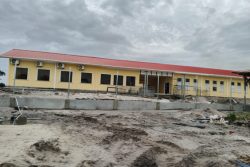 ‘Constitutions are seldom made by the will of men. Time makes them. They are introduced gradually and in an almost imperceptible way. Yet there are circumstances in which it is indispensable to make a constitution. But then do only what is indispensable. Leave room for time and experience, so that these two reforming powers may direct your already constituted powers in the improvement of what is done and the completion of what is still to be done.’ Benjamin Constant, 1814
‘Constitutions are seldom made by the will of men. Time makes them. They are introduced gradually and in an almost imperceptible way. Yet there are circumstances in which it is indispensable to make a constitution. But then do only what is indispensable. Leave room for time and experience, so that these two reforming powers may direct your already constituted powers in the improvement of what is done and the completion of what is still to be done.’ Benjamin Constant, 1814
By the time this article is printed the Court of Appeal will have already made its decision on the action to prevent GECOM from using essentially the numerical results from the recount of the March 2nd elections to make a final declaration as to the status of those elections. Thus, although much of what I say here may appear irrelevant, notwithstanding arguments to the contrary, this matter may well end at the Caribbean Court of Justice and I have come upon a few contentious issues that my rudimentary jurisprudential orientation suggests will remain in focus as we go forward.
Firstly, I have heard it said that no laws exist to make it possible for GECOM to annul elections; that the constitution saves this function for the High Court. Even if this is so, there is a vast difference between being able to annul an election and saying from a management position that an election should be annulled. Previously, I argued around the elements that should be taken into account when present or future courts are dealing with Article 177(2)(b) of the Constitution, which states, ‘Where …. there are two or more Presidential candidates, if more votes are cast in favour of the list in which he is designated as Presidential candidate than in favour of any other list, that Presidential candidate shall be deemed to be elected as President and shall be so declared by the Chairman of the Elections Commission acting only in accordance with the advice of the Chief Election Officer, after such advice has been tendered to the Elections Commission at a duly summoned meeting.’ Since it is illegal for certain categories of persons to vote and certain behaviour to occur on elections day, by ‘if more votes are cast in favour’ the constitution could only possibly have meant for GECOM to make its decision based upon what it considers legal/valid votes. Therefore, GECOM should act accordingly and those who question its interpretation can make a legal challenge by way of elections petition or, if possible, even before.
Article 162 of the Constitution states that the Commission ‘shall exercise general directions and supervision over the registration of electors and the administrative conduct of all elected members of the national Assembly, i.e. the total management of the elections process. Therefore, it must have tacitly also given to GECOM the remit to have in place systems to detect and document illegal and invalid voting; where the illegal voter can be identified to refer such matters to the police, assess the extent of such occurrences; take measures to prevent such behaviour in the future, say if the occurrences are of such magnitude as to have affected the outcome of the elections, etc.
‘Every act of a delegated authority, contrary to the tenor of the commission under which it is exercised, is void.’ [and] ‘Constitutions are seldom made by the will of men. Time makes them. They are introduced gradually and in an almost imperceptible way.’ Therefore, no law can legally prevent GECOM from doing the above if it is to effectively and transparently manage the electoral process, and where a law does not exist it must be implied until the legislative powers get around to dealing with the matter in a fashion consistent with the constitution. That is why international best practice could have been definitive on this issue. ‘While decisions on and conduct of prosecutions of voter fraud would generally, and more appropriately, be the responsibility of civil law enforcement authorities, the electoral management body requires systems in place to fulfill’ the above responsibilities (http://aceproject.org/ace-en/topics/vo/vog/ vog05/vog05b/mobile_ browsing/onePag).
Secondly, I hear controversy and wonderment about the number of valid votes the GECOM CEO has given to parties that has placed the coalition ahead of the PPP/C; rather than finding this odd it only confirms my conviction that the PPP and PNC are involved in a massive level of electoral chicanery. Future Notes of 11th September 2019 observed that, ‘In 1992, … after much sought after electoral reforms, including house-to-house registration, the population of Guyana was about 748,600 and there were 348,195 registered voters. In 2015, the year of the last general and regional elections, the population was 767,432, an increase of 18,832 or about 2.5%, but the number of registered voters was 585,722, an increase of 237,527 or 68.2%.’ I concluded that ‘an objective effort must be made to fix the problem before elections are held and for me, this trumps constitutional and other legal concerns.’
In 2020, the population has fallen to about 750,204, but registered voters are 661,278! In a context where there is an intense ethnic struggle for power and elections are won or lost on small margins, quite apart from the other deleterious political consequence – it helps to limit the possible effect of so called ‘swing votes’ – not making every possible effort to clean the list was a recipe for disaster. I will not deny that strenuous efforts were made to prevent the list from being cleaned: all I will say is that we must now all live with the consequences.
Finally, I pointed out a few weeks ago that the historic narrative has been that an election will be invalidated only if the irregularities, mistakes or errors complained of affected the result of the elections, but that courts have been departing from this strict quantitative approach and now place the need to comply with electoral rules at the centre of election management and litigation. However, even those who still hold to the quantitative method have stated that ‘the presence of corruption, even if widespread, is no basis to upset an election and nullify the votes of the electorate’ if the ‘majority of untainted votes supported the winning candidate’ (SN: 10/06/2020).
If then we allow that votes can become tainted, we can question the CEO’s notion of taintedness and its application, but what we should not logically do is feign incredulity as to the process under discourse. Since during the recount only the Coalition identified and reported on boxes to be challenged and these were mainly in PPP strongholds, it is obvious that although the Coalition will also lose some votes (92,819: from 217,920 in the recount to 125,101) in the process the PPP/C will lose more (176,708: from 233, 336 to 56,628). Indeed, if the intent is to deal with credible/legal/valid votes, the CEO had to take these challenges into consideration and although they were focused on PPP constituencies, again we have an indication of the massive nature of electoral manipulations in Guyana. He reported 4,864 impersonations in every region of the country and this, together with other infractions, tainted 60% of the votes cast and so it would be madness to give a win to the Coalition based upon the validity of 40% of votes!
There is in our context a particularly utopian constitutional requirement calling upon the president and the leader of the opposition to agree upon the appointment of the Chancellor of the Judiciary and the Chief Justice. Months ago, the Caribbean Court of Justice idealistically sent the same parties away to negotiate essentially the same problem they are now contemplating returning for it to solve! Both of these approaches are lodged in the false belief that Guyana is somewhere nearing a normal democratic polity (Guyanese democracy has not yet been born. 06/03/2019).
What our political structure and culture have produced are essentially counterfeit democrats who are unable to negotiate political differences and thus resort to an adversarial court system that is not geared to political healing.







